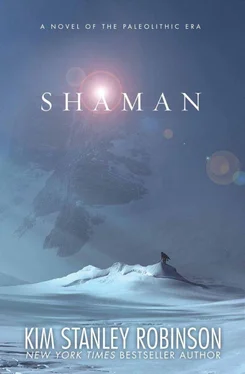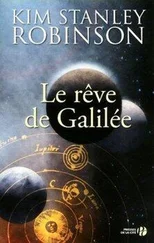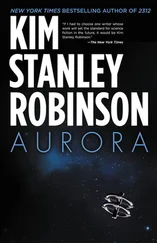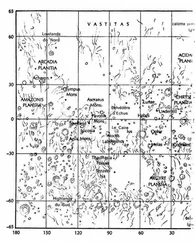Kim Robinson - Shaman
Здесь есть возможность читать онлайн «Kim Robinson - Shaman» весь текст электронной книги совершенно бесплатно (целиком полную версию без сокращений). В некоторых случаях можно слушать аудио, скачать через торрент в формате fb2 и присутствует краткое содержание. Город: New York, Год выпуска: 2013, ISBN: 2013, Издательство: Orbit, Жанр: Фантастика и фэнтези, Историческая проза, на английском языке. Описание произведения, (предисловие) а так же отзывы посетителей доступны на портале библиотеки ЛибКат.
- Название:Shaman
- Автор:
- Издательство:Orbit
- Жанр:
- Год:2013
- Город:New York
- ISBN:9780316235570
- Рейтинг книги:4 / 5. Голосов: 1
-
Избранное:Добавить в избранное
- Отзывы:
-
Ваша оценка:
- 80
- 1
- 2
- 3
- 4
- 5
Shaman: краткое содержание, описание и аннотация
Предлагаем к чтению аннотацию, описание, краткое содержание или предисловие (зависит от того, что написал сам автор книги «Shaman»). Если вы не нашли необходимую информацию о книге — напишите в комментариях, мы постараемся отыскать её.
From the New York Times bestselling author of the Mars trilogy and 2312 comes a powerful, thrilling and heart-breaking story of one young man's journey into adulthood -- and an awe-inspiring vision of how we lived thirty thousand years ago.
Shaman — читать онлайн бесплатно полную книгу (весь текст) целиком
Ниже представлен текст книги, разбитый по страницам. Система сохранения места последней прочитанной страницы, позволяет с удобством читать онлайн бесплатно книгу «Shaman», без необходимости каждый раз заново искать на чём Вы остановились. Поставьте закладку, и сможете в любой момент перейти на страницу, на которой закончили чтение.
Интервал:
Закладка:
—Tank oo, he said.
After that Heather sent the boys up to guard him and give him some of the worst overwintered nuts, and she worked her medicine on one of his legs. It was mostly a matter of rest, she told Loon.—Injury needs rest, you can’t take things too fast. Healing happens, but it takes time. So you have to give it time. A moon and fortnight for that hurt you had, and him too.
She appeared to whistle a similar message to the old one, for he did lie around for most of a moon, eating and drinking what Heather and Loon brought him. She taught him a number of words in that time, but the one she said the most was,—Slowly, slowly, with her hands and movements illustrating what she meant by it. He nodded from the waist when assenting to her, and with a visible effort said,—So-ly, so-ly.
When he was finally getting around on his feet pretty well, he came to her one morning after dawn and held her hand in both of his, whistled briefly, and took off toward Lower Upper Pass. After that they saw him from time to time in the distance, in the way they occasionally spotted other local woodsmen, who mostly tried never to be seen, but sometimes got careless. And from time to time there was an offering of snow hare or baby goat, or flowers, left in front of Heather’s nest. And she left things out there near the old one’s broken shelter as well, in the same way that she left things out for her cat.
Because Loon slept near Heather and helped her, he got more of a chance to see the old one than many of the group; and because he went out with Thorn, or on Thorn’s behalf, to gather chunks of earthblood from the spot under Northerly ridge called the Giants’ Knapsite he continued to see the old one out on the land. The old one was like a woodsman, it seemed: cut off from his pack, if he had ever had one. He bumbled through his rounds like a bear, setting traps for little animals and birds, eating berries and grass seed along the way. He moved strangely, and his smell was as if a little fermented. His beard was like a saiga’s beard, straggling under his chin, providing a point to balance the massive shelf of his eyebrows. His beaky nose had perhaps been smashed to the side at some point. His hair was held back by a leather band, and hung down freely over his shoulders. He wore a fur cape all the time, and now went barefoot, as if his bearskin shoes had worn out and he could not make new ones.
Thorn believed one could not become a good engraver without learning to make good tools. A good straight burin, some good blades, and a nicely edged scraper made all the difference. When it was rock against rock, you wanted your cutter as hard and sharp as possible.
So they sat in the sun and hit blocks of flint with choprocks of granite and schist.
Thorn stretched like a cat in the sun, and said,—Wait, I see something.
—Not another one of your riddles.
—They are not my riddles. They are the world’s riddles. Listen:
Silent my clothes when I walk on ground
Or stay at home or cross a stream.
Sometimes my life and the lift of the wind
Raise me above the place where people walk
And then the power of clouds carries me far
Above the human world and my clothes
Loudly echo and send forth a song.
They clearly sing when I am not in touch
With earth or water but a flying spirit.
Now find out what I am.
—You are the second wind, Loon said, thinking of his recent night return from the hunt with Hawk and Moss, and pleased to have seen the answer so readily.
Thorn laughed.
—What, aren’t I right?
Thorn tipped his head left then right, which was his sign for yes and no.—It’s like the second wind, he allowed,—but you think small.
—The second wind is never small, Loon objected.
People said Thorn had been a very strong hunter in his youth, but Loon had not seen it. Maybe he had forgotten what the second wind felt like when it came into you.
—Granted, Thorn allowed.—The second wind is big. But it’s even bigger than that.
—I’ll think about it.
—And smaller too, don’t forget. Most boys posed that riddle say it’s about a grasshopper. And he laughed at the look on Loon’s face.
Thorn spent a lot of his mornings taking care of the kids on the flat at the east end of camp, where the trees gave them a mix of sun and shade. He was much different with the little ones than he was with adults. He sat among them playing with their toys and goofing around, while also running them through their lessons.—They’re so much easier than you, he would say to Heather and Loon.
—Children are the true human beings, Heather intoned, whether sarcastic or not Loon could not tell.
—Well, it’s true. They’re not old enough to have problems. I’m so tired of you all and your problems. Men and women are just big bags of problems.
—You should know, Heather said.
—Indeed I should, watching you and all the rest. My time is much better used with the kids.
—A pinch of mother is worth a pack of shaman, Heather reminded him.
Thorn only waved her away with the back of his hand.
But with the kids in the morning sun it was different.
—Wait, I see something: little dots in the distance.
—The birds are coming back! the kids would say.
—That’s right. Our summer friends. We’ll see that again real soon. But wait, I see something: little wood crumbs falling out of a tree.
—The grouse is up there eating, one of them said. If just one of them spoke up, it was usually Thunder’s daughter Starry.
—That’s right. Some people call them rock pounders because of the funny whirr they make when they run. You’ve heard that sound. On the coldest nights they sleep under a blanket of snow. You can walk around on a snowy morning and surprise them sometimes, catch one for breakfast. But you have to be fast.
The kids assured him they were fast, and he agreed.
—Wait, I see something: tiny bits of charcoal scattered on the snow.
Silence.
—No? It’s one of the white-in-winters. The beaks of ptarmigans. They’re so white in the winter, all you can see is their beaks. It looks funny. Wait, I see something: we are wide open in the bushes.
Again silence.
—Another white-in-winter! It’s the eyes of the snowshoe hare. They watch you when they’re hiding, and their eyes are the only part of them you can see. How about this; wait, I see something: a bit of charred wood waving around in the air.
—Same again! Starry said triumphantly.—The ermine’s tail in winter.
—Very good! And then wait, I see something more: far away yonder, a fire flash comes down.
—Fox in the summer, Starry declared.
Thorn tousled her head.—You’re going to be a handful, kid. All right, last one. Wait, I see that the river is tearing away things around me.
—Is it you? Starry asked, eyes round.
Thorn laughed.—Yes, you bad girl. But it can be an island too. But we’re all islands.
And they decided to make a toy village on a puddle island and then drown it all in a terrible flood from a bucket. They all loved that game, Thorn most of all.
Chapter 15
Out with Sage, at the bog where the Edich dropped into the Urdecha, to collect herbs for Heather.
Sage filled her basket slowly, distracted by thoughts of her own. She had long legs, and the hair on them was a fine black down, nearly invisible against her dark skin. Her shirt was loose, and when she bent over to pick a sprig of mint or thyme her breasts were revealed, swinging together like udders. Loon hummed happily and begged a kiss, but she wasn’t in the mood. She picked green moss for the two babies’ diapers, but it was also for the next full moon, when the women’s house was crowded, and so Loon pretended not to notice. Full moon was an odd time, because so many women would retire to their shelter and do things on their own, while at the same time the young men gulped down berry mash and went out to see things in the full moon’s pale but revealing light. In other packs it wasn’t like that; in some, most women bled at new moon, and huddled together in the starry nights around the fire, waiting it out. Either way they would need a lot of dried moss.
Читать дальшеИнтервал:
Закладка:
Похожие книги на «Shaman»
Представляем Вашему вниманию похожие книги на «Shaman» списком для выбора. Мы отобрали схожую по названию и смыслу литературу в надежде предоставить читателям больше вариантов отыскать новые, интересные, ещё непрочитанные произведения.
Обсуждение, отзывы о книге «Shaman» и просто собственные мнения читателей. Оставьте ваши комментарии, напишите, что Вы думаете о произведении, его смысле или главных героях. Укажите что конкретно понравилось, а что нет, и почему Вы так считаете.











